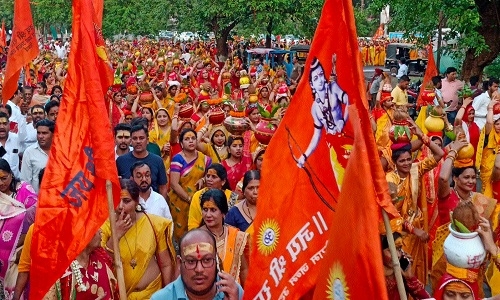Steel Plant, religious discourse taking center stage in upcoming election in Bhilai
| Date :24-Apr-2023 |

By E V Murli
Bhilai, one of the most prestigious assembly constituency in Chhattisgarh appears to be all prepared to witness a pitched battle, as politicians gear up for the upcoming election. Bhilai’s importance stems from the existence of the Bhilai Steel Plant, which has attracted an erudite conglomeration of the population to this constituency. The constituency was earlier a single entity but was later divided into two, Vaishali Nagar and Bhilai.
Both these constituencies have a significant population of people who are either working in the Bhilai Steel Plant or are retired from it. The people who have worked in or are associated with the plant have a deep attachment to it and cannot accept any political pressure against it. Tradition dictates that politicians who have worked without creating hurdles for the plant have succeeded in winning elections, while those who go against it face stiff challenges.
For many years, Bhilai was a stronghold of the Congress as long as the Steel Workers Union was powerful. However, the emergence of the BJP in 1990 saw a shift in power, with BJP candidate Prem Prakash Pandey winning from Bhilai and subsequently being made a minister in the Sunderlal Patwa cabinet. Since then, the BJP and Congress have been winning Bhilai consecutively or otherwise, and the constituency has gained a reputation of its own. However, in the run-up to the upcoming election, politicians have started using a new tactic to lure voters - religious discourses. Prem Prakash Pandey and his supporters are said to be behind the organisation of a discourse by eminent religious scholar Pt Pradeep Mishra, while the sitting MLA of Bhilai Devendra Yadav and Durg MP Vijay Baghel’s supporters had earlier organised a religious discourse and Hanuman Chalisa to showcase their religious bend of mind.
This increasing trend of using religious discourses for political gain seems to have become a compulsion for politicians, who hope to ensure their popularity and earn popular votes. However, they must understand that Bhilai has always differed in its voting pattern and is deeply involved with its sentiments associated with the plant. The people of Bhilai expect their politicians to do better for the constituency and raise their voice whenever trouble looms around the Bhilai Steel Plant. While religious discourses may be a new trend in politics to gain votes, politicians must remember that they will be judged on their actions and not just on their religious affiliations. Bhilai has a reputation of its own, and only time will tell whether this new trend will be of any help to the politicians in the upcoming election. The Bhilai Steel Plant’s significance and the sentiments of its people have been a crucial factor in shaping the political scenario of the constituency. It remains to be seen if the use of religious discourses will prove effective in swaying the voters in the upcoming election or whether politicians will need to focus on concrete actions to gain the people’s trust.
